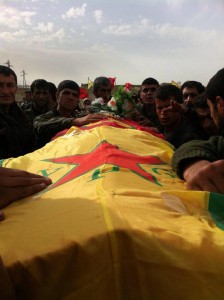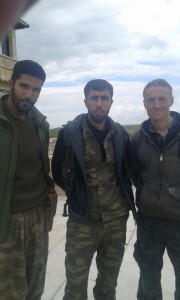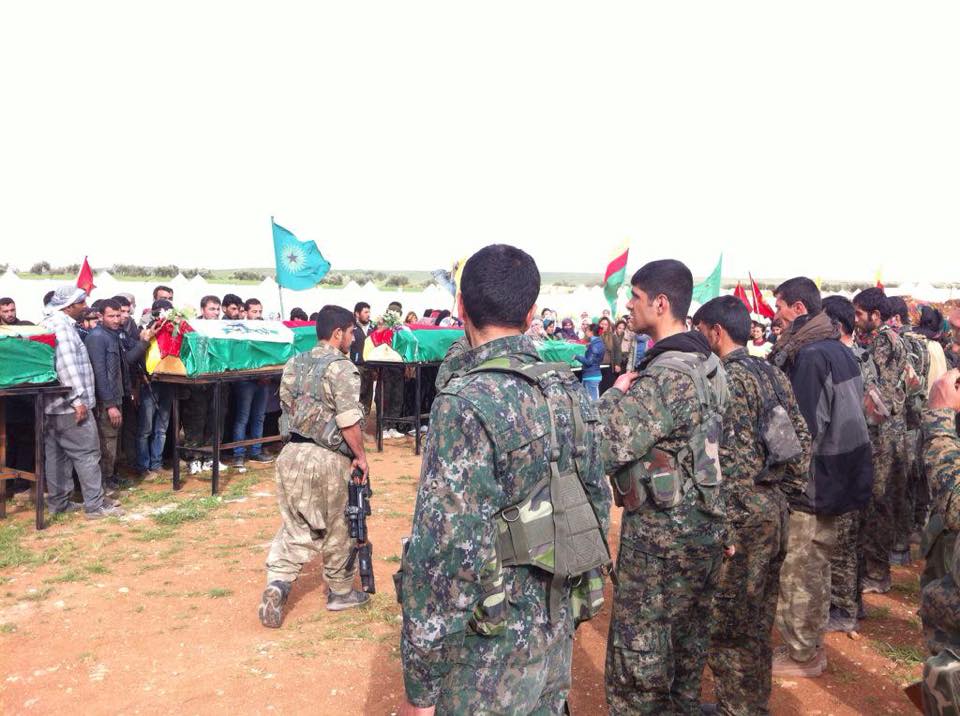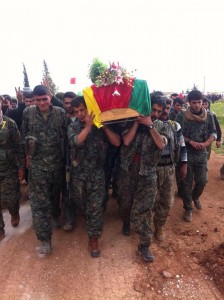“He became martyr, but he saved hundreds of lives. Every sniper he has trained will escalate the struggle in his memory. So the hero of Kobanê, Musa the sniper will live forever.”
Following the liberation of the city centre of Kobanê, the perception of the general public that the war is over, in a way, isolates the struggle of Kobanê. The clashes persist in a vast area from the town of Sirrin in the south of the city, to the borders of Girê Sipî (Tell Abyad) in the east. When clashes become violent, news about casualties from YPG front arrive.
Just a few days ago our hearts ached with the ‘qlam’s (requiems) sang by Viyan Peyman for her comrades that fell martyrs and for Kobanê; subsequently another news about a loss came from Herdem. Herdem, who fought at many spots from the month of October, during the most violent times of the conflict, has passed away on Tuesday at the clashes that intensified in the southeast of the city.
From Rojhelat to Kobanê
Herdem, who was born and grown up in Rojhelat (Iran), spent his childhood doing smuggling to make a living for numerous years. After meeting with the Kurdish freedom movement, he joined the ranks of the struggle and conducted
activities in various areas. He came to Kobanê in October, when the clashes were very violent and struggled in numerous critical zones. During clashes, fighting as a sniper between YPG and ISIS fronts, he became one of the personages that has changed the course of the war.
He became known to the world as “Musa the Sniper” with the news published at the leading newspapers around the world, subsequent to a photo interview he gave to AFP,, right after the liberation of the city centre of Kobanê. Consequently, he became one of the symbols of the war at Kobanê, just like Vasili Zaytsev who was iconized as a result of the success he has shown while fighting against German Nazis at the Soviet army during second world war.
Hardem had said that following this, he was continuously threatened via calls made to his transmitter and mobile phone; he then came to the city centre and participated in the educational activities herein for a short period. Meanwhile, YPG and YPJ fighters were continuing to gain ground and were responding with their self-defence to the close contact and hot encounters without the support of coalition forces at the southeast of the city, around a factory owned by a French company. Herdem lost his life at this critical turn point at his last battle at the front… Herdem, who has trained many fighters, who has established a sniper unit for the fighters with whom he has shared his experience and knowledge with, left behind him numbers of comrades that are fighting for the freedom that he believed in as his only legacy.
Responsibility at their shoulders, companionship at their eyes
I came across Herdem at Kobanê while I was there to follow up with the recent developments. Marcello, with whom I met at the border, and who subsequently joined YPG ranks, came to pick me up with a vehicle that had broken windows and bullet holes all over it. When we went to the garage where military vehicles of YPG were being repaired, Herdem was the one who welcomed us first. He was saluting us, leaned on a passenger van with a faint smile on this face, we shook hands.
He was the commander of most of the fighters around us and the respect he has earned together with his humble attitude had penetrated right to his character. He was not a giant that we held in awe; nevertheless, he was the architect of practices that can be defined as heroism. With his warm-heartedness, he was also shifting the rote of command and order between himself and his comrades. While he was carrying the responsibility of the struggle that he believed in, there was no sign of fatigue on his face. That day, there, we did not have a chance to talk. Everything else about him, I have learnt from others…
Herdem gave time to Marcello to spend time with me, he was even driving the car himself. He asked “where would you like to go heval”. He left us in a house where we could have some tea. On our way back to the city centre, unable to hide his admiration, Marcello was talking about Herdem as a hero. A few hours had passed by, after having drank the tea, we were startled with the sound of horn. Herdem came to pick up his comrades (students). The last time I saw him, he was smiling in the vehicle, raising his hands. “şew baş heval” he said, they drove away and perished.
Days after, when I told Marcello, who was back home in his country, that Hardem had passed away, he initially could not get his head around it, and then he wrote the following about his comrade and teacher:
Hero of Marcello and Kobane
They know him as Musa the sniper, but I knew him as Heval Hardem. He was my commander and my teacher. He was the best warrior that I have seen in all of Kobanê…
In the city when we were few and DAESH was occupying most of the buildings, the sniper was king. The Chechen snipers limited the movement of comrades and caused many of them to fall martyrs. These were highly paid mercenaries coming from abroad to destroy us. We could not even raise our heads with the fear of being struck by sniper fire.
Then Hardem came. At that moment “Musa the sniper” of Kobanê was born to strike back fear in waylyers’ hearts’. If the snipers were kings in Kobanê, then Hardem was the Emperor. Every time a problem came up, Heval Hardem was the man to call first. He would fight day and night, and after a while DAESH learned about his feat. No Chechen sniper could defeat him, many of us are alive because of him. If ever a true hero was born, that’s Hardem. Hero of Kobanê.
After the city was liberated, he joined the village operations, kept pushing the enemy away, sometimes taking entire villages by himself. He built the sniper unit, the Suxası Noqta, trained most of the snipers in Kobanê and me.
I always looked up to him, he would always sit in a low position, talk with a low tone. When there was less food, he would eat less to leave more to others. Our base was the only one in Kobanê with the flag of the Party, many times they would take it down because it was against the rules. And he would always go personally to the top of the building and put it back up again.
He was the best Commander I ever had since I came from Italy to Kobanê. Always smiling, always joking with us, just his presence would lift the morale of the group. Being a sniper is a dangerous job, the enemy always tries to hit us first. He knew that and he was always at the service of his snipers, trying to give us whatever he could.
He became martyr, but he saved hundreds of lives. Trained hundreds of snipers that are walking on his path. He trained me, Marcello, making me the man I am today. Every sniper he has trained will escalate the struggle in his memory. So the hero of Kobanê, Musa the sniper will live forever.
Her bijî Kobanê!
[Translated to English from the Turkish original at Sendika.org by Faika Deniz Paşa]






